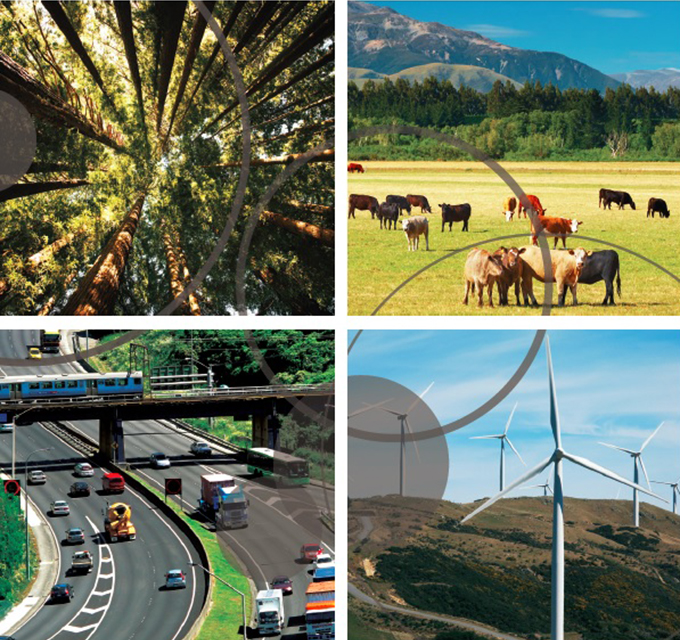
ANALYSIS: By David Hall of AUT’s The Policy Observatory
The problem with climate change – like any wicked problem – is that its story can be told in many different ways. The same goes for migration. The facts, as far as they go, can be conjured into a multitude of understandings.
Still, some stories are less credible than others. Michael Reddell’s recent analysis of migration and climate change in Newsroom is one.
That these vastly complex issues cross over at times is obvious: climate change leaves nothing untouched. But Reddell goes further by arguing that the Productivity Commission’s low emissions inquiry ought to treat immigration as a contributing factor to New Zealand’s rising greenhouse gas emissions; and that our national emissions targets should justify reduced inward migration.
His first argument is one of scale: “more people need more transport, more heating, more energy in their workplaces” – and hence more emissions.
Notably, though, he presumes current technologies and current prices. Not only does this misrepresent all likely futures, but also our actual past. The Ministry for the Environment’s most recent Greenhouse Gas Inventory 1990–2015 notes that energy emissions decreased in 2008–2011 and remained stable since, which is the same period that net migration rose steeply.
The Ministry attributes these reductions to decreased manufacturing emissions and increased renewable energy generation. We have more people, sure, but more people relying on our low-emissions energy. And what matters from the perspective of Earth’s atmosphere is what people emit, not where they emit it.
Emissions from transport, by contrast, have risen. Indeed, road transport emissions increased by 78 percent since 1990, offsetting those other reductions in fuel use.
Over-reliance on vehicles
But the fault here lies with New Zealand’s over-reliance on private vehicles. Migrants (and citizens) contribute to road traffic by necessity, because alternative means of transport are less available, indeed far less so than many migrants are used to, coming from places where travel by trains, trams, cycles and footpaths is not unusual.
If low-carbon alternatives in places like Auckland were more serviceable, migrants would doubtlessly use them, as indeed would citizens. And if the excuse for under-investment is the lack of markets of sufficient scale, then population increase and cultural change will drive progress.
Reddell’s second argument links migration to agricultural emissions. As I understand him, he argues that New Zealand’s high living standards depend upon dairy exports, which makes it politically infeasible to impose costs for environmental damages. The greater the population, the greater this reliance upon the dairy sector, and so the greater the reluctance to make polluters pay.
But it is bizarre to suggest that new and old New Zealanders – including those not employed in agriculture – rely so heavily on dairy for their standard of living. Sure, dairy is our largest export sector, but only 3.5 percent of total GDP.
Actually, many New Zealanders, including many farmers, rely on healthy environments for their standard of living, both in the non-economic sense of quality of life, and in the economic sense that tourism and exports benefit from New Zealand’s clean, green reputation. (Tourism, incidentally, accounts for 5.6 percent of total GDP.)
This is likely why – contra Reddell – a strong majority of New Zealanders (77 percent) do support water charges for agriculture and horticulture, despite the fiscal burden.
It is also misleading to treat economics and environment as a zero-sum game, as if one must lose out in order for the other to gain. It simply isn’t the case that internalising the environmental costs of agriculture necessarily undermines profitability.
Innovation proves point
Innovation within the dairy sector proves the point. Recently, Lincoln University’s demonstration farm reduced nitrate leaching by 30 percent without undermining affecting profitability.
This contradicts Reddell’s claim that “all informed observers recognise that the marginal abatement costs in New Zealand, through conventional means, are high”. I’ve written for Pure Advantage about the potential of forests – both production and permanent forests – to offset agricultural emissions in a way that isn’t only cost-effective but potentially profitable.
This is corroborated by other “informed observers”, such as the Royal Society of New Zealand, the Parliamentary Commissioner for the Environment and Vivid Economics. The latter’s Net Zero in New Zealand report highlights other low-cost opportunities in energy efficiency, heating technologies, agricultural efficiency, and technological advances in methane vaccines and cheaper electric vehicles.
What’s striking about all this is not only Reddell’s argument is from the perspective of climate change, but also economics. He resists the orthodox view that migration has a modest positive impact on national GDP.
I’m no enemy of disciplinary iconoclasm, but it does beg for robust positive arguments. Reddell’s appeals to uncertainty (economists cannot prove definitively that migration increases GDP, therefore it might not be true) do not count. Climate scientists are all too familiar with this kind of denial.
So if economic evidence cannot always carry his arguments, one can only conclude that non-economic reasons are doing some of the work. To Reddell’s credit, he is explicit about his concerns for cultural cohesion, or that “Islam is a threat to the West, and a threat to the church wherever it is found”.
These are real reasons for wanting to reduce immigration, but should be debated on their ethical and sociological merits, not couched in an idiosyncratic take on climate policy.
When it comes to global warming, it’s the carbon intensive economy, stupid. The only genuine solution is to transform the world’s high-emissions economies into low-emissions economies, so that anyone entering them by way of birth or migration can lead a prosperous low-carbon life.
Our national emissions targets are a means to this global end. Focusing on peripheral issues like migration only distracts from the work that needs to be done. But that’s what happens when you tell the story of a global problem through a nationalist lens.
David Hall is senior researcher at The Policy Observatory, AUT, where he researches migration and climate policy. He is also editor of the BWB Text, Fair Borders?: Migration Policy in the Twenty-First Century. This article is republished with the author’s permission.












































